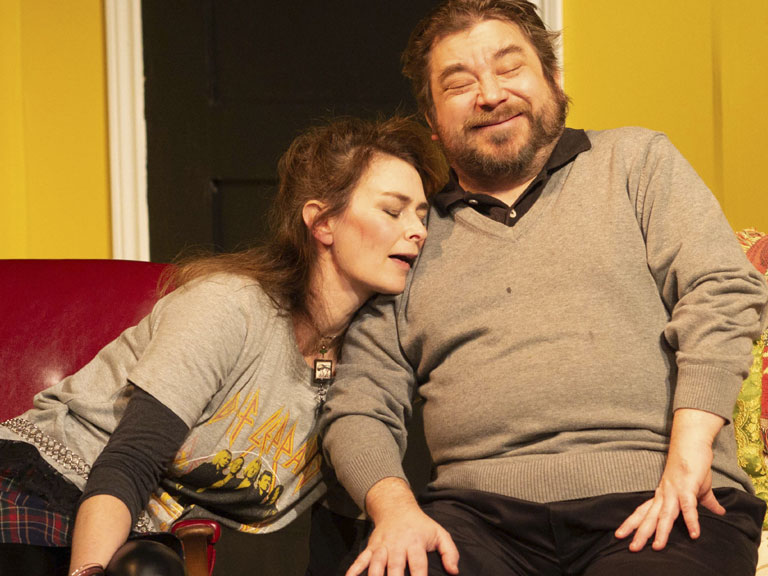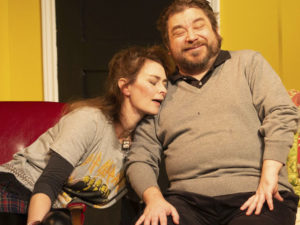County News
Making God Laugh

Play traces family’s evolution over three decades

Maddie (Kim Kennedy) and Thomas (Kyle Watson) suffer from post-dinner torpor.
Each scene in Prince Edward Community Theatre’s production of Making God Laugh ends with a family snapshot. The five family members sit with frozen smiles as the camera’s self-timer ticks down the seconds before the instant is captured, a static tableau that bears little resemblance to the dynamic and sometimes heart-wrenching events leading up to it. The play comprises four scenes, each centred approximately a decade apart and occurring on a major holiday. The play opens on Thanksgiving 1980, as emptynesters Ruthie (Fran Larkin) and Bill (Fred Lester) prepare to welcome back their three twentysomething-year-olds for the first time since the last of them moved out. Ruthie is obsessed that everything be just perfect, and the scene opens with her worriedly setting ornaments and decorations in place, while Bill tries to act as a calming influence. Then the kids arrive and the dynamics start, with the inexorable feeling that it’s only a matter of time before a wheel comes off this wagon. Eldest son Richard (Adam McGowan) is a self-described playboy with a gift for choosing bad investments and even worse colognes, middle child Maddie (Kim Kennedy) is an aspiring actress and a bitter disappointment to her mother. The youngster, Thomas (Kyle Watson), is the golden child of this Catholic household; he intends to become a priest.
The play follows the family over four such holiday dinners, first in 1980 and then 1990, 2000 and finally 2010. Clothes, hairstyles and attitudes change with the times. The home furnishings and Ruthie’s reviled “Festiva Dip” do not. Making her directorial debut, Cheryl Singer keeps the production moving and allows the actors to project their own emotional stamp onto their characters. She was intrigued by the play, written by Sean Grennan, when she came across it while looking for something to stage in the 2019 season. “I found it extremely funny and I just loved the fact there was an opportunity for some great costumes and music,” she says. “Another interesting concept that I liked was that it spanned over 30 years. So we get to check in on different decades, different references, costume and hair, and those elements really helped feed the whole production. We’re looking at how people change, and what may be the dreams of children in their 20s and how they change over the decades.”
Singer has brought together an experienced cast for this production, although in the case of Kennedy, her experience has been off-stage rather than on stage. She has been an assistant stage manager for several community theatre productions, and was persuaded to audition for this play. “It’s been a lot of fun, and I think having the experience of stage managing has helped because I’ve seen how other people interact and heard the things that directors have talked about, such as making sure you keep your energy levels up,” she says. “Cheryl has been a big help when it comes to preparing for the transition from being in my 20s at the beginning of the play and in my 50s at the end. It’s a comedy, but there are scenes that are pretty emotional.” Kennedy is drawing on some of her own family experiences to build out her character. “In the play, I’m outspoken and I stand up for myself, and I’m thinking about the arguments you had in your 20s with your parents, but also my interaction with my brother. I’m sure my brother will come to the play and say, ‘Oh, that’s what she’s like in real life.’”

Ruthie (Fran Larkin) and Bill (Fred Lester) share a tender moment while the kids are elsewhere.
Although the most recent reference in the play is nearly a decade old, Singer contends that the play is still relevant for a modern audience. “The theme is a universal feeling of family and siblings and how when kids have grown up and moved away, Mum and Dad still want to have an influence on their grown children. And you’ve got grown children, when they come home they become kids again with the same sibling rivalries and alliances,” she says. It is in that personal interaction where Singer is imparting her directorial stamp. “I think I come from finding an emotional place for the characters, as opposed to the way to deliver a line. I like them [the cast] to feel how that character feels, what are their emotions. And they’ve been very receptive. I want them to buy into the relationship. I want to feel that I’m watching Mum and Dad and the kids. I want to feel that they are a real family, and I think they’ve really delivered that.”
Making God Laugh plays at Mt. Tabor Theatre in Milford on March 2 and March 3, and March 9 to March 10. Tickets are available at Sidestreet Gallery in Wellington and at Books & Company in Picton. Please visit pecommtheatre.ca for more details.

Comments (0)